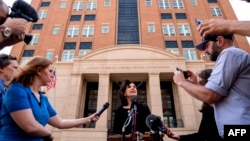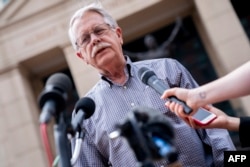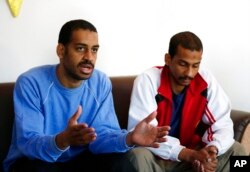The families of American hostages kidnapped and killed in Syria by Islamic State militants welcomed a guilty verdict handed down Thursday by a U.S. court.
A jury took just over four hours to find British national El Shafee Elsheikh guilty on eight counts related to his role in holding about two dozen Western hostages in Syria, including four Americans who were killed.
American journalists James Foley and Steven Sotloff and aid workers Peter Kassig and Kayla Mueller were among those kidnapped and later killed by the IS cell.
"This is a day that we didn't need bombs or bullets to bring justice," said Diane Foley, James Foley's mother. "I really feel that justice prevailed."
Mueller's father also welcomed the verdict.
"We all saw the American justice system do what it does best," said Carl Mueller, who attended the hearing with his wife, Marsha, at U.S. District Court.
The two-week trial included testimony from witnesses who were held captive by Elsheikh and other members of an IS cell known by their hostages as "The Beatles" because of their accents.
In total, 26 hostages were held between 2012 and 2015. Witnesses detailed the cruelty meted out to them, including beatings, being forced to fight each other, and sexual violence. Family members testified about the ransom demands made of them.
Elsheikh was captured in 2018 along with IS cell member Alexanda Kotey. The pair were brought to the United States to stand trial in 2020 after the U.S. agreed to not seek the death penalty.
Kotey pleaded guilty in 2021 in a deal that could allow him to serve part of his life sentence in Britain.
A third member of their cell, Mohammed Emwazi, also known as Jihadi John, was killed in a drone strike in 2015. He killed Foley, Sotloff and Kassig in 2014, in videos shared as terrorist propaganda.
Mueller was held before being handed over to IS leader Abu Bakr-al-Baghdadi. The court heard she was raped repeatedly before her death in February 2015.
Randall Rogan, a terrorism expert and professor of communication at Wake Forest University in North Carolina, described the trial as a "strike for justice."
"It's great news that the witnesses were able to pull themselves together and be able to testify under such difficult circumstances for themselves and having to revisit the horrors of that time for themselves and for their families," he told VOA on Thursday.
"Hopefully, this is a positive note, a strike for justice, that this individual is ultimately being held accountable for the atrocities that he committed," Rogan said.
The Committee to Protect Journalists described Thursday's ruling as "a step toward accountability."
"While the verdict and sentence won't bring Foley or Sotloff back, it establishes a precedent toward justice for their families, and for the murders of journalists and human rights abuses worldwide," said Justin Shilad, CPJ's senior researcher for the Middle East and North Africa.
Speaking at the opening of the trial, Diane Foley welcomed the decision to make her son's captors stand trial in the U.S.
"I think we must do the opposite of what was done. That to me is the huge contrast," she said. "The British and American hostages were given nothing. They were treated like animals. They were tortured. They received … no beat of justice. I think it is important that we show how civilized people should react to others."
As the trial concluded, she told reporters she hoped it would shine a light on the more than 60 Americans still held hostage or wrongfully detained globally.
VOA's Sirwan Kajjo contributed to this report. Some information came from The Associated Press and Agence France-Presse.







